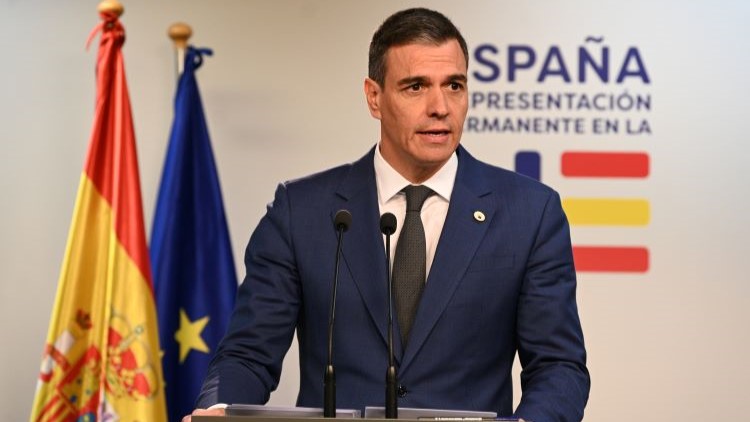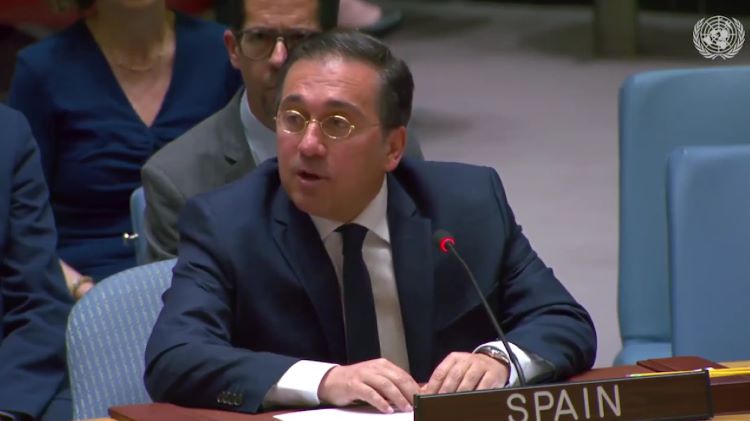Eduardo González
The President of the Government, Pedro Sánchez, assured yesterday in Brussels, at the end of the extraordinary European Council, that he will inform the parliamentary groups “before” taking the step of recognizing the Palestinian State. Likewise, he stated that the tour of several EU countries to seek support for his initiative has been “very positive” and assured that, although the Executive’s intention is to “take that step when circumstances allow,” he will continue “talking to other countries to give it jointly.
“We continue working, but the Government’s position is clear,” declared Sánchez in the press conference after the Council, in relation to his intention to recognize the Palestinian State in this same semester. “I will inform the parliamentary groups in advance when this step is taken, which will be when circumstances allow it,” he announced.
On April 4, the Minister of Foreign Affairs, José Manuel Albares, assured in Brussels that the Council of Ministers, “which is the one who makes the decisions regarding Spain’s foreign policy,” will approve the recognition of the Palestinian State before July and that Pedro Sánchez will later explain “that decision” in the Congress of Deputies.
In any case, the head of the Executive assured that Spain will continue “talking with other countries to be able to take this step together” and, in this sense, he gave a “very positive” assessment of his round of meetings with other European leaders to obtain support for its purpose of recognizing Palestine. “Spain is playing a vanguard role,” he said. “We have been able to see many similarities and similarities when addressing this catastrophe,” he added. In the extraordinary European Council itself, he added, the EU has appealed “to the two-state solution as the only possible way.”
Pedro Sánchez took advantage of his presence in Brussels to directly address this issue with the Maltese Prime Minister, Robert Abela (one of the four signatories, along with Sánchez and the prime ministers of Slovenia and Ireland, of a declaration in which they committed to recognizing Palestine), and with the head of the Luxembourg Government, Luc Frieden, with whom he agreed in the defense of “the two-state solution to offer a horizon of peace and stability to the region”, as explained by the President of the Government on social networks . However, the Luxembourg leader has not been very enthusiastic about the idea to date and in his country this issue has generated a lot of controversy.
Last week, the President of the Government obtained the support of the Prime Minister of Norway, Jonas Gahr Støre (although without specifying dates), and confirmed the accession of the new Prime Minister of Ireland, Simon Harris, who remained in the same line as his predecessor, Leo Varadkar. Separately, Sánchez received on Monday in Madrid the newly appointed Prime Minister of Portugal, Luis Montenegro, who also supported the recognition of the State of Palestine but did not want to join the President of the Government’s intention of taking this step before July and showed his preference for sooner reach an “international consensus” within the EU and the UN.
Regarding other issues addressed in the extraordinary Council, Sánchez warned that it is necessary to “condemn with the same firmness the attacks on the civilian population and the breach of International Law wherever they occur, be it Ukraine, the Middle East or the Sahel”, and indicated that European leaders have decided to “increase humanitarian and logistical support to Ukraine” and have expressed their “condemnation of Iran’s attack on Israel” and their commitment to providing humanitarian support to Lebanon and helping Syrian refugees.
Competitiveness
Regarding the debate on competitiveness, Sánchez admitted that he would have liked the EU leaders to have been “much more ambitious in their conclusions”, especially on issues such as “fiscal harmonization”, because Spain “does not do fiscal dumping, as other Member States do” and, on the other hand, does believe “in the virtues of the single market.”
Likewise, he agreed with the approaches and reforms proposed in the strategic report on the state of the single market, prepared by the former Italian Prime Minister and current president of the Jacques Delors Institute, Enrico Letta, commissioned by the Council of the EU and which was presented at the extraordinary Council. The document advocates reforming the single market and points out the need to finance the double green and digital transition and to guarantee economic security without forgetting social justice, equal opportunities and the well-being of citizens.
According to Sánchez, current global challenges generate an opportunity to improve integration through the Capital Markets Union, which will help attract private investments, diversify financing sources and undertake the necessary transformations. He also advocated moving towards an investment union so that Europeans’ savings stay in Europe and serve to finance companies and jobs. In any case, he warned, any reform must have citizens and the European social model “at the center of the debate.”
The President of the Government also defended the development of new common financing instruments and advocated better regulating national aid within the EU to protect the single market, simplifying processes that help speed up the deployment of projects and investments. To do this, he warned, “it is necessary to rethink the role of the European Investment Bank.”







